
On the West coast of the Fiji main island, a series of bits of land popped out of the ocean surface. These sandy mounds group together in 2 archipelagos, the Mamanuca and the Yasawa. To get there, it's rather straightforward since everything gets organized from Nadi and most of the people take a package including the bus transfer up to the Denarau pier, the shuttle by boat then an all-inclusive option on one of the islands. But if we have a little bit more than a few days, we can hop from an island to another one and stay as long as we want.
When I get on the morning bus full of young westerners, a great dose of a priori overwhelms me as for the kind of tourism on those islands. The harbour check-in area reinforces my suspicions and I'm very far from the serenity of Taveuni. I don't really feel comfortable among this flock of tourists. We board the « Awesome Adventures » catamaran and leave the bank. The sight of the first island clears away my bad thoughts on the mass tourism because this outcrop of wild life symbolizes the happiness for thousands of holidaymakers. This idyllic image often related but seldom precisely located. As if the one who knew its site doesn't wish « his » shangri-la be visited by other people. To talk again about this first island called South Sea Island, a hardly-50-meter-wide disc encircled by a broad white-sand beach and in its center, a few bungalows nestled in banana- and coconut trees. The ideal site to perform the XXI-century's Robinson Crusoe. In this connection, it's on one those islands the « Castaway » movie was shot. We pass by some other islands of the Mamanuca group such as Bounty, Treasure and Beachcomber islands and head for the Yasawa archipelago to finally arrive on « my » island, Kuata.



A wooden boat comes to pick up the tourists (only 3) who set their heart on this bit of land. A nice committee starts the invigorating welcome song and we land on the beach. Flowery shirts, large smiles, relaxed rhythm and brief introductions, we already feel well.
The gathering of bungalows belongs to village located on the opposite island. A fair-tourism since all the spent money goes to the community. And this island has a human dimension that cheers the heart up. Because in addition to the superb beach, the breathtaking view from the top of the rock and the lavish submarine scenery what we keep in mind of such an experience is the encounters that sum up with this sentence: At Kuata, you arrive as an unknown person and you leave as friend. Perpetual, infectious smile and exhilaration, and despite all the tourists who get to these islands every year, the inhabitants kept real ties in their traditions with the kava ceremony which happens every night at the bottom of wooden hut. Special slice of life where we chat, joke and play music and each one, whatever his origin and colour is free to take part in.
After sharing a lot during my sojourn here and having the feeling to know each member of the community, it's with the heavy heart I move away from the shore to go back to Nadi. Because in addition to the emotion of the departure, this last crossing sounds the end of my Fijian escapade and the unpleasant feeling of not staying enough time.


Keyword - traveling invitation -
Saturday 4 October 2008
smiles and happiness on a paradisiac island
By dorian on Saturday 4 October 2008, 08:47 - RTW2-Fiji
Sunday 28 September 2008
exhilaration at the other end of the world
By dorian on Sunday 28 September 2008, 16:26 - RTW2-Fiji

Nadi airport on the main island of Fiji, first contact with a Pacific island. I arrive for two weeks and am going to try to live in a local way for that time, that means not looking beyond the present. In the arrival hall, a travel agent unsuccessfully tries to sell me an all-inclusive tour. Despite my stubbornness not to book one of his excursions, he keeps on smiling and gives me a precious piece of advice which will prove to be essential for the next stage of my trip. In substance, he encourages me no to stay on the main island (Viti Levu where there are the towns of Nadi, Lautoka or Suva) and get to the small islands which are the heart of the Fijian spirit.
The population is a mix of Melanesians and Indians whose ancestors emigrated to Fiji in order to work in the sugar cane fields. These workers finally stayed and today represent 40% of the total population. This racial disparity is the main cause of the political instability where each community reproaches the other one its hegemonic desires. These last years, 2 coups d'état shook the country and consequently, the tourism dramatically dropped down.
Nadi is not really appealing. The next day, I hop on a minivan and head eastwards. My intention is to stop in the village of Pacific Harbour where we can dive with sharks. Unfortunately, I haven't booked in advance and the dive center is full for the next three days. Too much waiting, I pack my bag and set off again the next day. After one hour by car, I reach the capital city Suva where I board on a ferry in direction of the island of Taveuni. A long 20-hour cruise which drops me off on one of those remote islands where I hope to meet the Fijian culture and joie de vivre (exhilaration) praised by the travel agent at the airport. The ferry moors to a mere pontoon with no building around. A few taxis wait for the passengers but I prefer to stretch out my leg by walking along the coconut-tree-flanked coastal road. On the way, I stop at a dive center where I book an outing for the next day then I take to the way again towards the village of Naqara. A short hour of stroll where I pass alongside the local dwellings stifled by an invading vegetation. Native people offer me large smiles followed by a welcoming « Bula » (Welcome or good morning in Fijian). Life serenely goes on this small bit of land.
The dive center stands comparison with the villagers, laid-back atmosphere, certain joie de vivre and contagious smiles. On the boat, the warm-hearted ambiance carries on, we talk about rugby and I state that I'm coming from a city (Toulon) where rugby resembles a religion and is the topic of countless impassioned conversations. During our chat, I says that two Fijian players belong to the team (Sissa Koyamaibole et Gabiriele Lovobalavu). To these words, Jimmy, who officiates as captain of the boat this morning, suddenly turns back and says « you know Gabiriele Lovobalavu ! ». He informs me that his elder brother Kanito lives and works on the island in position of health inspector for the ministry of Health. He takes his phone, immediately calls him and an appointment is got for the next day. On top of the exceptional seabed that the Somosomo strait and the Rainbow reef offer, I'll be able to dip into the Fijian intimacy.


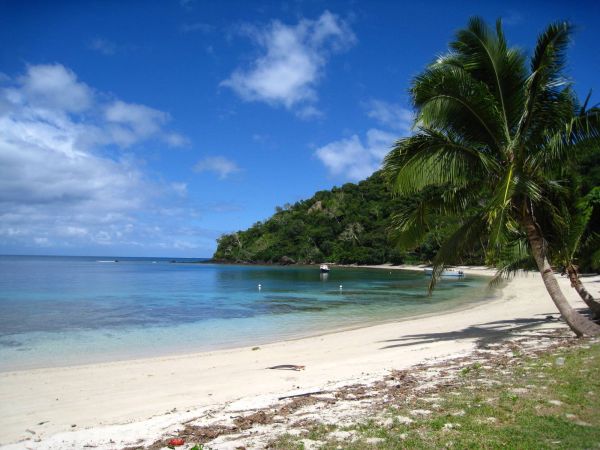

























The next day, I go to the police station where all the team mustered around a bowl of Kava to celebrate an event I forgot the name. That's here Kanito have given the appointment to me. I sit down as discreetly as possible when someone holds a microphone out to me asking to introduce myself. About thirty of pairs of eyes riveted on me, I stand up and explain why I'm here ; Then I keep on shaking the hands of all the guests. The following of the meeting is more informal when every two minutes someone holds out to me a coconut bowl full of kava I must knock back. The kava is the national beverage, a pounded root mixed with water which has the taste and the colour of the muddy water. With friends, family or workmates, there is no lack of opportunities to meet around this elixir.
outside this celebration, I take part of the sporting events as spectator with an athletic event and then a rugby tournament where each team represents a parish of the island. Guaranteed fervour around the playground. I will finish my evening at the Kanito's house with his family. Great time of sharing and laughing around the dinner with a special feature. At the other end of the world, a poster of the rugby club toulonnais is hanged to the wall.


Saturday 13 September 2008
A certain conception of the happiness
By dorian on Saturday 13 September 2008, 11:01 - RTW2-Malaysia
No sooner said than done, I pack my bag and leave to try my luck on the east coast of the Malaysian peninsular. According to the weather forecasts, it should be fine – or not rain at least. The choice of the islands is quite large and I opt for Pulau Redang, not really an island for backpackers since to get there we must book a package in advance which includes nights and submarine activities. The harbour is rather chaotic. Each resort has its own boat or subcontracts this part to another resort and without a guide it would have been hard to find my way by myself. The journey lasts one hour when I swap the shuttle-boat for a small one, about a hundred meters from the shore.
I take off my shoes and land on a barren beach. A strip of sand a series of bungalows are laid on and surrounded by a thick forest of coconut trees. It's off-season which accentuates the Robinson Crusoe of my arrival. This narrow strand of sand gathers everything I like, walking alone one a remote beach, scaling on the rocks where monkeys took up residence, sitting down and listening to the rumble of the water or turning over the sand to look for shells. I entertain a certain conception of happiness.

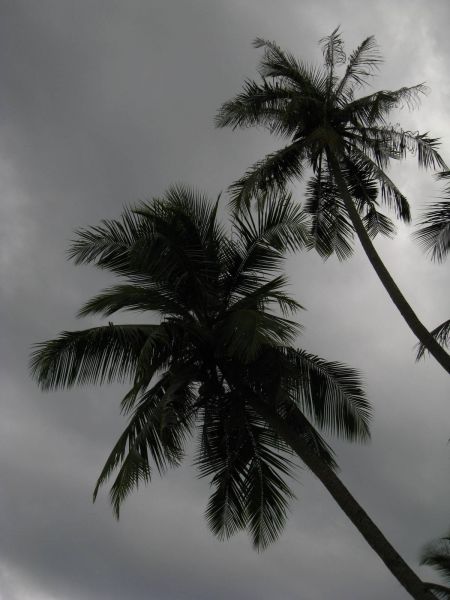













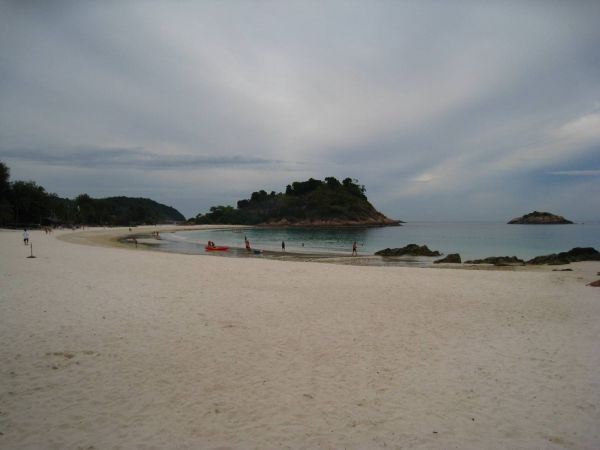


To complete this peaceful life, the day is made up of 2 or 3 dives to enjoy the pleasure of the underwater landscapes. And the most difficult thing when I flounder into the water is to see my pressure gauge invariably going down and realize kicking up is inevitable because I don't have air in the tank any more.
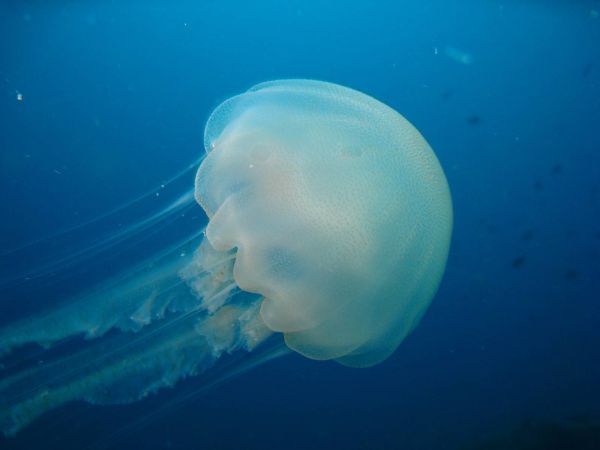
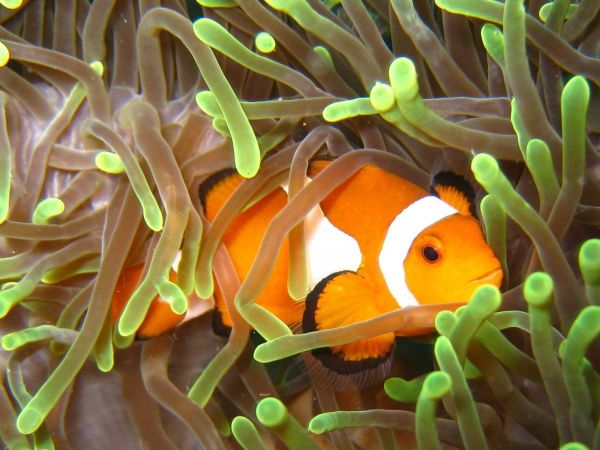











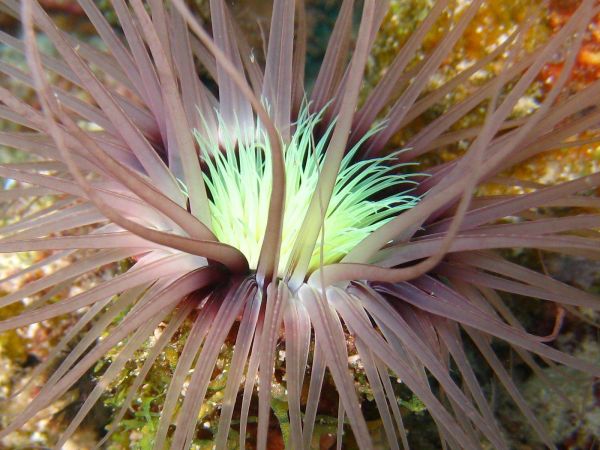














« previous entries - page 6 of 12 - next entries »







































 visits
visits